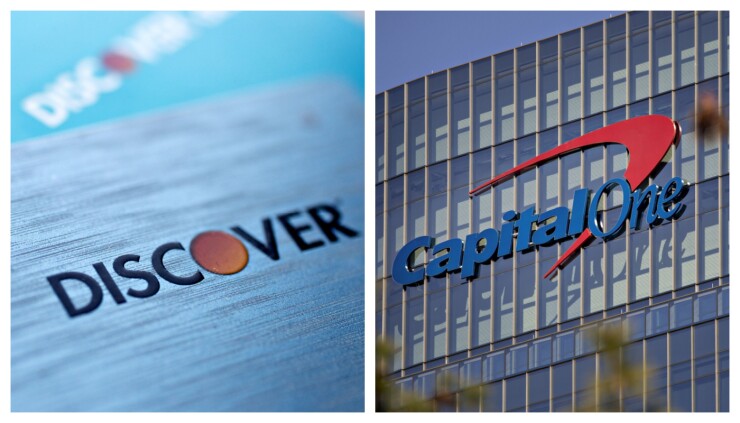Discover Financial Services is doing more cleanup ahead of its pending acquisition by Capital One Financial, inking the sale of its troubled student loan business and setting aside substantial funds to cover looming regulatory penalties.
The tie-up with Capital One
But Discover is ridding itself of past troubles as it prepares to be bought. This week, it followed through on plans to sell its $10 billion private student loan portfolio, which has long been a source of trouble with regulators.
And it said Wednesday that it's set aside money to cover "expected regulatory penalties" after
The two banks' teams are "working well together" on planning for the merger, with Capital One leading the process, Michael Shepherd, a Discover board member who became its interim CEO in April, said Thursday.
"We are encouraged by how the merger planning and application processes are progressing and continue to believe that the strategic rationale, operating scale and economics of the combined company are compelling," Shepherd said on the company's second-quarter earnings call.
Shepherd and other Discover executives did not take any questions during the call with analysts.
Discover got a good price in its sale of its $10.1 billion student loan portfolio to the investment firms KKR and Carlyle, analysts said. The buyers agreed to pay up to $10.8 billion, a roughly 7% gain-on-sale margin.
"We see the relatively strong premium on the portfolio as indicative of the high quality and attractiveness of the book," RBC Capital Markets analyst Jon Arfstrom wrote in a note to clients.
Carlyle has recently been increasing its presence in the student loan market. Earlier this year, it
Discover said it expects to close the student loan deal by the end of 2024 and will finalize the transfer in multiple stages. Firstmark Services, a division of the student loan servicer Nelnet, is taking over responsibility for working with borrowers.
The portfolio sale has been in the works for months. In November, Discover
The sale is "an important milestone in our journey to simplify our operations and business," Shepherd, Discover's interim CEO, said Thursday.
The student loan servicing issues appear to have
When Discover announced earlier this month that it had settled a class-action lawsuit with merchants, it said that regulatory punishments could follow.
On Wednesday, the company said it boosted its expenses last quarter as it prepares for "expected regulatory penalties" on the issue. Discover's total operating expenses rose by $325 million, or 23%, from the same period last year. Discover said it would have reported a 9% increase without the funds set aside for the penalty.
John Greene, Discover's chief financial officer, said the actual penalty is subject to more discussions with regulators "and may be more or less than this amount."
The Riverwoods, Illinois-based company also said that it benefited from settling a case where it was suing an unnamed party over an undisclosed matter.
"We are happy to have this matter resolved and are satisfied with the favorable financial outcome," Shepherd said.
On the Capital One merger, Shepherd said he expects Discover shareholders will vote this fall on whether to approve or reject the combination.
Shepherd and Capital One CEO Richard Fairbank are both scheduled to speak Friday at a virtual public hearing that the Federal Reserve and Office of the Comptroller of the Currency are hosting.
Capital One executives may reiterate their message that the credit card market would remain competitive following the merger, countering critics' claims that combining the two would create a credit card behemoth and limit consumers' options. The two banks' executives will also
Capital One negotiated its community benefits plan, which is contingent on the merger being finalized, with the groups Woodstock Institute, the National Association for Latino Community Asset Builders, NeighborWorks America and the Opportunity Finance Network.
The two companies will also participate in an Aug. 9 in-person public hearing held by Delaware's bank regulator.







